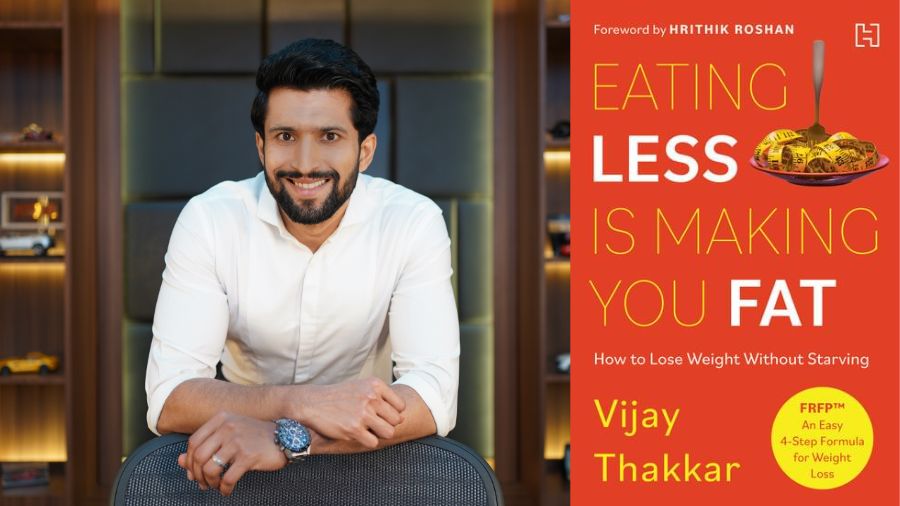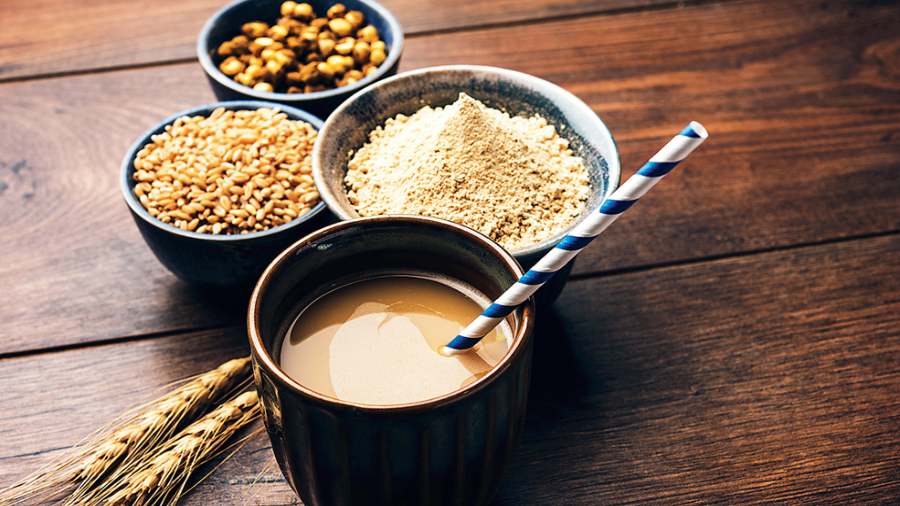If you’re starting your journey towards fitness and conscious, healthy living, there is one person you should know about — author, celebrity health coach and functional medicine expert Vijay Thakkar.
Thakkar’s fitness philosophy has three fundamental pillars — regular workouts, food and nutrition, and rest and recovery. Founder of 48 Fitness in Mumbai, he published his first book, Eating Less is Making You Fat: How to Lose Weight Without Starving (Hachette India), in January. The 392-page book is a guide to getting started on a sustainable and healthy lifestyle, and also has a foreword by Hrithik Roshan.
My Kolkata caught up with the author and fitness guru to get answers to all the questions that one wanting to get on the health train might have. Edited excerpts follow…
My Kolkata: Diets have always been popular. What prompted you to demystify diets?
Vijay Thakkar: My inspiration came from personal experience and failure to lose weight with diets that didn’t work for me. When I started 48 Fitness, my fitness club brand, in 2013, I came across many members who fell prey to similar fad diets and ideas about eating less and consuming a low-calorie diet to lose weight. Most of them, without exception, regained weight because these are not sustainable and spoiled their metabolism and body. So when I witnessed myths and bad science being promoted to a large set of gullible people, I started penning down my research with my book to bring the facts out to them. With this book, I wanted to challenge commonly held beliefs about dieting and help people better understand the science behind weight loss and healthy eating without starving.
What, according to you, is a balanced diet that can help control weight?
In my view, a balanced diet that can help control weight should emphasise whole, unprocessed food with a wholesome nutrient matrix to give you the right type of calories for weight control. It should include the following:
- Adequate protein — 1.2gm for every kilogram of body weight — to maintain lean muscle mass and bone strength.
- Complex and slow-digesting carbohydrates from millets and vegetables for sustained energy.
- Healthy fats from nuts, seeds, dairy, unprocessed meat, fish, and fatty fruits such as coconut, olives and avocado for healthy hormone production and satiety.
- Dietary fibre to improve digestion and regulate blood sugar levels.
- A variety of vitamins and minerals from whole, unprocessed foods.
Stress is a common lifestyle side-effect these days — how does one control that in order to achieve a balanced life?
In my opinion, there are a few pointers to keep in mind. The first would be avoiding excessive alcohol consumption and smoking. Along with that, practising mindfulness and deep breathing exercises along with working out is a good start. Prioritising self-care and leisure activities such as playing sports, swimming, outdoor biking, walking in nature, among other things also help in a big way.
It is also important to manage stress effectively with techniques such as meditation, yoga and even group therapy. Also, getting adequate sleep is essential. So the key to managing stress, in the long run, is addressing the root cause of stress, rather than just its symptoms, for improved well-being.
You talk about how stress affects hormones in one’s body, making it more difficult to lose weight — can you elaborate on this?
Chronic stress affects hormones in the body, making it harder to lose weight. It changes the levels of cortisol, insulin, ghrelin and leptin in the body which can have varying effects from increased belly fat and slower metabolism to unhealthy food cravings and a risk of type 2 diabetes.
The word ‘metabolism’ is used increasingly nowadays in conversations. What is the true meaning of this word and how does it affect weight loss?
Metabolism is the body’s internal process by which it converts food into energy. It involves a complex network of hormones and enzymes that control the speed at which the body burns calories, which in turn plays a crucial role in weight loss. Simply put, faster metabolism results in burning more calories, while slower metabolism burns fewer calories.
In the book, I explain that various factors — genetics, age, muscle mass, hormones, lifestyle — affect metabolism and one must pay attention to it. Optimising metabolism with boosting strategies like strength training, protein-rich foods, ets can help achieve and maintain a healthy weight.
‘Calories’ is another word that is thrown around a lot when talking about diets. Is measuring calories the right way to go about your diet? What are calorie-deficit diets and it is something one should try?
There are better ways to determine a healthy diet than measuring calories. In my book, I argue that counting calories can lead to an obsession with specific foods and numbers, builds a toxic relationship with exercise, and counting calories doesn’t take into account the quality of the food being consumed.
A calorie-deficit diet is one in which, “theoretically”, calories consumed is less than calories burned. These can result in weight loss in the short run, however, the data and literature on this subject have confirmed that it is not a sustainable weight management tool.
It’s more important to listen to your body and eat when you’re hungry, stop when you’re full, and choose foods that support overall health and well-being. Individuals can sustainably achieve a healthy weight without counting calories by focusing on eating a balanced diet.
Intermittent fasting is also a trend that seems to have caught up, is it advisable?
Intermittent fasting (IF) offers flexibility to allow it to become a lifestyle rather than a seasonal pursuit and I believe that IF is a potent tool for healthy living and can lead to weight loss. Many approaches, from daily fasting to weekly, can be adapted to suit an individual’s lifestyle habits so evaluate the approach that most suits your requirements and can easily be sustained and adopted as a lifestyle.
If done for the wrong reasons, IF can backfire and cause things like overeating, or muscle loss and an imbalance of hormones that regulate hunger, fullness, and metabolism, making it harder to lose weight or causing weight gain in the long run.
While IF may be appropriate for some people under certain circumstances, it is essential to consider individual needs and goals when determining the best approach to weight management.
With so much information out there on the internet and social media, how difficult is it to separate fact from fad?
In the world of weight loss, separating facts from fads can be pretty tricky. Many weight loss fads and diets are based on incomplete or outdated information, which can be harmful or ineffective in the long run. So I always warn dieters against adopting quick fixes and miracle diets and instead going for a sustainable approach to weight loss, which requires an understanding of the biology of weight reduction. So, seek sources based on scientific research and be way of overly simplified or sensationalised information.
Does eating right help with acne and hormone-related issues? If yes, how so?
Yes, eating a nutritious, balanced diet can significantly impact various aspects of health, including skin health, hormonal balance, and menstrual health.
A diet high in processed foods and sugar can lead to inflammation and breakouts and disrupt the delicate balance of hormones. Whereas a diet rich in fibre, healthy fats and nutrient-dense foods like vegetables, fruits, millets, eggs, dairy, nuts, seeds, meat, seafood, pulses, grains and legumes can help promote clear skin, and healthy hormone regulation.
PCOS is a common ailment for women these days. What kind of dietary and lifestyle changes would you recommend?
Polycystic Ovary Syndrome (PCOS) is related to stress and having a diet high in processed foods, sugar, and unhealthy fats, which can disrupt hormones and contribute to developing PCOS and even cause heavy or irregular menstrual cycles. Some dietary and lifestyle changes can help women support their hormonal health and manage their symptoms. Eat a nutrient-rich diet, limit sugar and processed foods to regulate hormones in the body and slow down or even reverse the development of PCOS. It’s also important to manage stress and incorporate physical activity. Stress management techniques like yoga, meditation, or deep breathing are crucial and physical activity improves insulin sensitivity, regulates hormones, and promotes overall health.
How important is meal planning to maintaining a healthy diet?
In my view, it is imperative. Emphasis should be put on taking the time to plan and prepare meals, especially fermented foods, in advance.
Meal planning does not have to be complicated or time-consuming and that simple steps like making a grocery list, prepping ingredients in advance, and having healthy snacks on hand such as whole fruits, nuts, sprouted bhel and boiled eggs can make a big difference in maintaining a healthy diet.
How does one control sugar and junk food cravings?
Controlling cravings initially takes strategy, time and effort. You can break the cycle of cravings by making dietary and lifestyle changes, and developing a healthier relationship with food.
Incorporate leafy greens, protein-rich foods, and healthy fats in your food and stay hydrated as dehydration can sometimes be mistaken for hunger. Lack of sleep can contribute to cravings and a drop in fitness as well. And also, reduce exposure to junk food by avoiding it in the home, workplace, and when eating out.
Do you think mental health plays a part in weight gain and loss?
Mental health plays a significant role in how an individual gains or loses weight. Stress, anxiety, and negative body image can affect one’s relationship with food, leading to unhealthy eating habits and weight gain. Bad mental health days can also cause cravings.
Practising mindfulness along with improving body image through self-care and self-compassion are important practices.
By addressing mental health concerns,and seeking support from loved ones and professionals, you can develop a beneficial relationship with food.
Since your book mentions a four step formula, without going into much detail, what are four simple things someone should remember when looking to manage their weight?
- Balancing feeding and fasting phases — some form of fasting is necessary to rejuvenate the body and improve insulin sensitivity.
- Limiting sugar and processed foods is vital to improving the regulation of fat stores and appetite signals to the brain, which helps us regularise eating patterns.
- Your body should be fueled by healthy and naturally occurring fats such as dairy, eggs, seafood, nuts and seeds.
- Prioritise protein in every meal to a minimum of 15 grams to improve satiety from a meal and getting essential nutrients to help the body rebuild itself regularly.
Based on my extensive research and more than a decade of practice in functional medicine, I believe these four steps can help anyone improve their health, regulate their hormones, and maintain a healthy weight.
Rapid fire
- A food item/group to include in your diet: Vegetables
- A food item people should skip: Table sugar
- A diet or trend that should not be followed: Eating less
- One health that should get more attention: Fasting
- An easy exercise people can can do: Walking
- Cheat day allowance to maintain a balanced life and diet: At most, two meals weekly
- Your top choice for a meal: Eggs
Get your copy of Eating Less is Making You Fat: How to Lose Weight Without Starving here.








